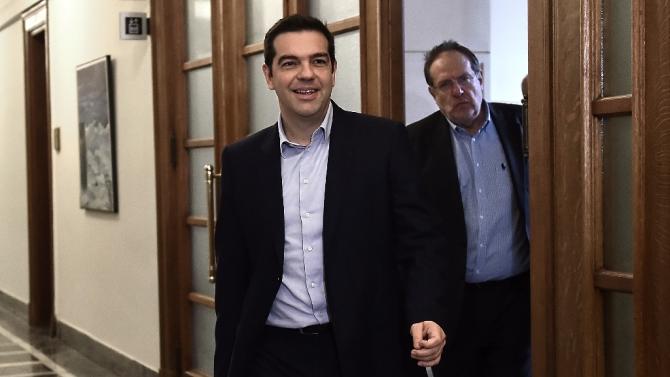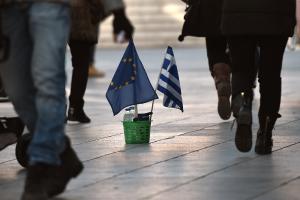Tensions with Germany over 'greedy' Greece's debt
Tensions with Germany over 'greedy' Greece's debt
Athens (AFP) - Renewed tensions emerged Thursday between Greece and Germany as attention turned to Athens's huge debt load two days after the stricken eurozone country secured an extension of its bailout.
The new left-wing government experienced its first opposition protest, meantime, with several hundred anti-capitalists and anarchists marching against the agreement with eurozone partners.
Greece, whose economy has shrunk by a quarter in six of its annual economic output.
Prime Minister Alexis Tsipras, who swept to power last month on a wave of anger over years of austerity cuts, wants to use the four-month bailout extension secured on Tuesday to renegotiate that mountain of debt.
Finance Minister Yanis Varoufakis, the frank-talking economics professor hired by Tsipras to reach a better deal with Greece's creditors, called Wednesday to "begin immediately" discussions to bring that about.
But with Greece having already secured a 100-billion-euro write-down of its debt to private creditors, and two bailouts of 240 billion euros, German Finance Minister Wolfgang Schaeuble expressed Thursday his "disbelief" at the very idea.
"I can't see anything in what Varoufakis is doing that makes life easier for us," the veteran German minister was quoted as telling a parliamentary group meeting.
"No more billions for the greedy Greeks!" screamed mass daily Bild Thursday under a huge "Nein!" ("No!") headline.
In Athens on Thursday, a small anti-capitalist party organised a demonstration against the agreement.
Some 200 people attended that protest, and another 300 black-clad anarchists followed in their wake, police said.
A couple of shops had their windows broken with hammers, AFP reporters said, and Greek TV showed footage of bus stops and pay phones similarly vandalised.
- Confidence returning -
The extension to Greece's lifeline still needs approval from the German parliament and possibly that of Greece, but passage should be a formality despite unease among some lawmakers in both countries.
The German lawmakers are expected to approve Greece's hard-won bailout extension in a parliament vote on Friday, a key hurdle for keeping the crucial international aid flowing to Athens.
To secure the lifeline, Tsipras's new hard-left government published a six-page list of proposed reforms focused on boosting tax receipts and cutting spending through improved efficiencies.
But Tsipras, 40, had to temper campaign promises to hike the minimum wage, reinstate laid-off civil servants and alleviate poverty by vowing that this would be done only in consultation with Greece's creditors.
Varoufakis meanwhile told Bloomberg TV that 700 million euros was deposited at Greek banks on Tuesday.
That is a fraction of the 20 billion euros withdrawn in panic when elections were called and Greece lurched into a new crisis in December, but Varoufakis said this showed confidence was returning.
"There was a deposit flight back into the Greek banking sector," the fluent English-speaker told Bloomberg. "It's a question of direction. Once you turn the tide, you hope."
- Doubts in Deutschland -
But Greece, which has been in almost constant crisis mode since 2010 as it fights to stay in the single currency zone, is by no means out of the woods.
German Chancellor Angela Merkel said Wednesday that the extension was just a "starting point," and that Berlin was under "no illusions" about the challenges ahead.
Schaeuble went further, saying that there was a "lot of doubt in Germany" about whether Athens will stick to the commitments.
"The question now is whether one can believe the assurances of the Greek government or not," Schaeuble said.
According to a survey published on Wednesday, only 21 percent of Germans are in favour of extending the bailout.
The International Monetary Fund and the European Central Bank, which together with the eurozone states hold most of Greece's debts, have also expressed misgivings.
Over the coming four months Greece needs to firm up its reform plans and prove by the end of April that they are bearing fruit before receiving a final bailout disbursement of 7.2 billion euros.
In the meantime Greece has to repay several billion euros' in maturing debts, including some two billion euros to the IMF in March, and April and 6.7 billion euros in ECB bonds maturing in July and August.
In 2015 Greece has to pay back around 19 billion euros.
"We are going to have problems repaying IMF debts and the ECB in July," Varoufakis told Alpha Radio, while denying that this would give the government liquidity problems.
In the Bloomberg interview, Varoufakis suggested that the ECB could settle Greece's debts with the IMF using around two billion euros in bond profits that he said Athens is due.
"This is money we are owed," he said. "I find it very hard to imagine that Europe and the IMF will allow us to trip over what is a relatively small cash problem."yahoonews











Comments